- Events & Programs Home
- Calendar
- Accessibility
- Adults
-
Families & Teens
- Families & Teens Home
- 10x10 Teen Art Expo
- Art on the Rise
- Art Together: Art Making for Families with Children Ages 3–5
- Babies Sing with May Festival Minis
- Boy Scouts / Girl Scouts
- CAM Kids Day
- Family Storytime and Gallery Walk
- Family Studio: Art Making for Families with Children Ages 6–12
- Games in the Galleries
- Members-Only Baby Tours
- Public Baby Tours
- REC Reads
- Rosenthal Education Center (REC)
- Saturday Morning Art Class
- See Play Learn Kits
- Summer Camp
- Teen Fest: Zine and Comic Exchange
- RECreate
- Teachers
- Community Outreach
- Fundraisers
- Plan Your Own Event

- Events & Programs Home
- Calendar
- Accessibility
- Adults
-
Families & Teens
- Families & Teens Home
- 10x10 Teen Art Expo
- Art on the Rise
- Art Together: Art Making for Families with Children Ages 3–5
- Babies Sing with May Festival Minis
- Boy Scouts / Girl Scouts
- CAM Kids Day
- Family Storytime and Gallery Walk
- Family Studio: Art Making for Families with Children Ages 6–12
- Games in the Galleries
- Members-Only Baby Tours
- Public Baby Tours
- REC Reads
- Rosenthal Education Center (REC)
- Saturday Morning Art Class
- See Play Learn Kits
- Summer Camp
- Teen Fest: Zine and Comic Exchange
- RECreate
- Teachers
- Community Outreach
- Fundraisers
- Plan Your Own Event
Blog: CAM Uncovered
Blog: CAM Uncovered
- Home
- Plan Your Visit
- Art
-
Events & Programs
- Events & Programs Home
- Calendar
- Accessibility
- Adults
-
Families & Teens
- Families & Teens Home
- 10x10 Teen Art Expo
- Art on the Rise
- Art Together: Art Making for Families with Children Ages 3–5
- Babies Sing with May Festival Minis
- Boy Scouts / Girl Scouts
- CAM Kids Day
- Family Storytime and Gallery Walk
- Family Studio: Art Making for Families with Children Ages 6–12
- Games in the Galleries
- Members-Only Baby Tours
- Public Baby Tours
- REC Reads
- Rosenthal Education Center (REC)
- Saturday Morning Art Class
- See Play Learn Kits
- Summer Camp
- Teen Fest: Zine and Comic Exchange
- RECreate
- Teachers
- Community Outreach
- Fundraisers
- Plan Your Own Event
- Give & Join
- About
- Tickets
- Calendar
- Exhibitions
- Collections
- Blog
- Shop
Happy Holidays!
by Emily Holtrop Director of Learning & Interpretation
11/18/2022
permanent collection , winter , holidays , Christmas , Thanksgiving , Hanukkah , winter solstice , Kwanzaa , New Year , collection
Welcome to the Holiday Season! From Thanksgiving to New Year’s Day, the late autumn and early winter is a time for reflection and celebration. Explore these festive scenes—all works on paper—from the museum’s permanent collection and discover the season’s joys. Due to their light sensitivity, these artworks are not on view. Search for works depicting your favorite holiday in “Explore the Collection” here.
Thanksgiving
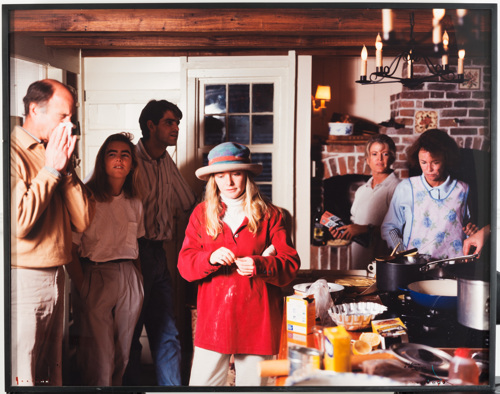
Tina Barney (American, b. 1945), Thanksgiving, 1992, chromogenic development (Ektacolor) print, Museum Purchase with Funds Provided by Thomas R. Schiff, 2002.11
Who is making the pumpkin pie? Who is bringing the green bean casserole? Questions asked every November as families across the United States prepare for their Thanksgiving feast. This photograph, by artist Tina Barney, reflects on a moment many have experienced—a kitchen crowded with family. Are they helping or in the way? As a child, nothing was more exciting than Christmas morning. You run to the tree, all a-glitter with lights and tinsel. Has Santa been there? This early 20th-century photograph by Nancy Ford Cones portrays that moment when it is time to play with your new toys. What was your favorite Christmas toy? A new doll or maybe a Brownie camera?
Hanukkah
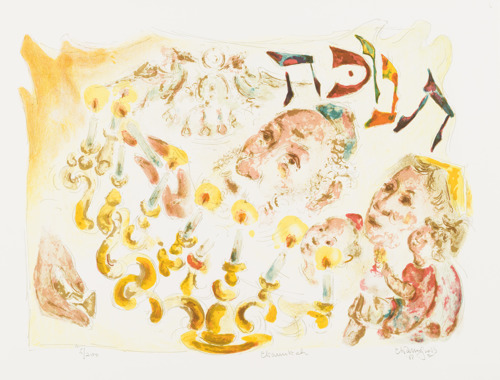
Chaim Gross (American, 1902–1991), Hanukah (Feast of Rededication), 1968, color lithograph, Gift of Dr. and Mrs. Sidney A. Peerless, 1973.443.6
In Hebrew, Hanukkah means Dedication. Lighting a candle each night for the eight days of Hanukkah commemorates the victory of the Maccabees over the Syrians and the rededication of the Second Temple of Jerusalem in 165 BCE. This color lithograph by Chaim Gross encourages us to ask how we will dedicate ourselves to a new year.
Winter Solstice
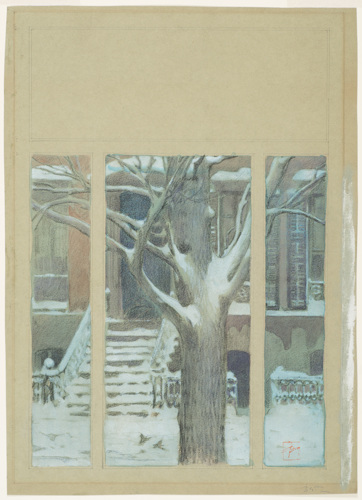
Robert Frederick Blum, (American, 1857–1903), Grove Street, Winter, 19th century, watercolor, Gift of Henrietta Haller, 1905.128
Look out your window; overnight, snow has fallen and blanketed your neighborhood in a fresh layer of white. Winter has come. In this watercolor, Robert Frederick Blum has captured the peace of the season’s first snowfall. How will you spend your winter solstice? With sleds and skis or cocoa and a warm fire?
Christmas
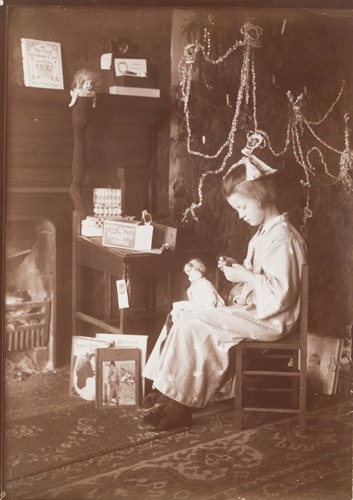
Nancy Ford Cones (American, 1869–1962), Christmas Morning, circa 1914, printing-out-paper photograph, Gift of Albert Vontz, 1982.194
As a child, nothing was more exciting than Christmas morning. You run to the tree, all a-glitter with lights and tinsel. Has Santa been there? This early 20th-century photograph by Nancy Ford Cones portrays that moment when it is time to play with your new toys. What was your favorite Christmas toy? A new doll or maybe a Brownie camera?
Kwanzaa
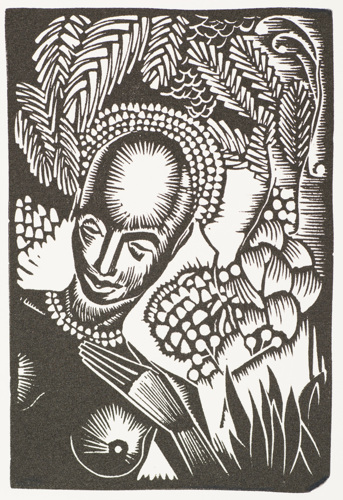
Hale Woodruff, (American, 1900 –1980), African Headdress, designed 1931–1946, printed 1996, linoleum cut, Gift of Auldlyn Higgins Williams and E. T. Williams, Jr. of New York in memory of the Rt. Rev. Herbert Thompson, Jr., Bishop of the Diocese of Southern Ohio, and Russelle Cross Thompson, 2016.39.1
Kwanzaa is a celebration of African-American culture based on harvest festival traditions from various parts of West and Southeast Africa. For seven nights, celebrants light a candle representing a principle of Kwanzaa: Unity, Self-Determination, Collective Work and Responsibility, Cooperative Economics, Purpose, Creativity, and Faith. How does this linoleum cut by Hale Woodruff represent the holiday?
New Year’s Day
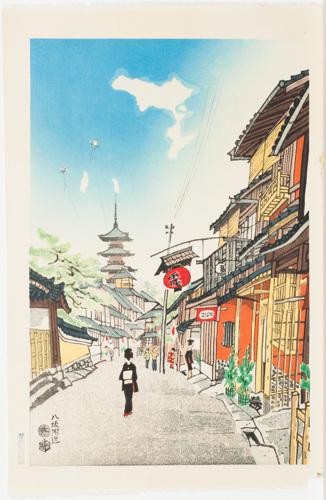
Kotozuka Eiichi (Japanese, 1906 –1979), Street Scene in Kyoto on New Year’s Day (Yasaka fukin [Yasaka neighborhood]), late 1940s– early 1950s, color woodcut, The Howard and Caroline Porter Collection (1995 Bequest), 1996.150
A quiet street in Kyoto, perhaps it’s early morning as few people are out and about. Last night’s celebrations, to wrap up the year past and welcome the year to come, are brushed away with the fresh snow. 2023—are you ready for the challenges and opportunities the new day and the new year brings?
Cincinnati, OH 45202
Toll Free: 1 (877) 472-4226
Museum Hours
Museum Shop
Terrace Café
Library
Cincinnati Art Museum is supported by the tens of thousands of people who give generously to the annual ArtsWave Campaign, the region's primary source for arts funding.

Free general admission to the Cincinnati Art Museum is made possible by a gift from the Rosenthal Family Foundation. Exhibition pricing may vary. Parking at the Cincinnati Art Museum is free.
Generous support for our extended Thursday hours is provided by Art Bridges Foundation’s Access for All program.

General operating support provided by:



